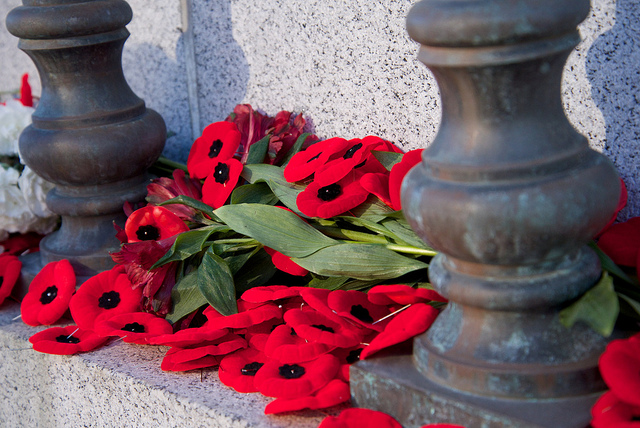I’m an unlikely Remembrance Day observer; growing up my family didn’t celebrate it.
Things related to the war and military seemed vaguely off-topic and even a little shameful in our secular and liberal-by-default Seattle household.
My parents had dabbled in protests during the Vietnam days, and while they don’t overtly reject patriotism, there was never a chance that we’d fly a flag at our house or put a yellow ribbon around any trees. But in an unlikely way, going to be with the veterans and salute the flag every November 11 has become a part of my practice.
I started going to Remembrance Day ceremonies about 6 years ago with my partner. His parents survived the war in Holland, and they’ve told stories of eating tulip bulbs and being sent to work on a farm because the family didn’t have enough food. My partner has more of a sense of war than I ever have, and so at first I felt like a bit of an imposter at these ceremonies. What does all the military stuff have to do with me?
On the drive to the ceremony I try to dig deep for some way to connect the experience to myself. I think of my grandpa serving in the war as a young man in the South Pacific as a radio technician, and he and my grandmother meeting in a hospital and falling in love. But this family storyline—long since cleaned of war tragedies happening at its edges—doesn’t really twinge my emotions the way I imagine it should. Here’s what it does, though, and here’s where Buddha’s in the bagpipes:
The stock-straight walk of the elderly veterans, their hats to the side, salutes practiced and precise. The bagpipers marching stolidly, playing the solemn beat, dignified and a little bit funny at the same time. The volunteer firefighters and search and rescue team standing awkwardly at attention, not as practiced in their movements but earnest just the same. I watch them marching through the choreography and we suddenly all seem so small up against the scale of the experiences we are there to mark. Something swells in me, not because of patriotism, and not because of gratitude—though when I reach deep down I do find this—it’s more that each time I take part in this ceremony, I see us all just as children, following rules that we make up, believing so strongly in the way that we order our world. Practicing our ceremonies, wearing our uniforms, playing our trumpets and our pipes, so small in the face of time and grief and the senseless game we are perpetually hooked in called war.
We are so much more than all of this, and yet so much smaller, too.
I don’t liken us to children in a condescending way. It’s just this sudden, spontaneous bagpipe-and-salute-induced swell of what’s called upekkha in Buddhism. It’s equanimity—a blend of sorrow and pride and connection and distance, feeling it all at once and seeing humanity like a bunch of children on a playground, each doing their best and their worst, getting hurt and healing, wounding and forgiving, all held in this web of life and time, and gathering together to take a moment to remember that. This washes over me every time I hear the whining strains of the bagpipers and the wreaths being laid down.
So each year at this ceremony, even though I don’t remember a war or the names of someone whose life was lost in one, I am reminded of this part of myself—this upekkha—that blooms up spontaneously like a flower in a field. I also remember that this flower—this capacity—is in all of us, and in the two minutes of silence as the crowd bows their heads together, I am thankful for the reminder.
~
Relephant:
Remembering my Grandfathers’ Spirits.
~
Author: Ryan Hilperts
Editor: Caitlin Oriel
Image: James Best/Flickr







Read 0 comments and reply